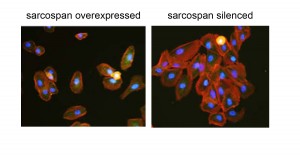-
 Cancer
CancerMayo Clinic Researchers Reveal Treasure Trove of Genes Key to Kidney Cancer
JACKSONVILLE, Fla. — A genomic analysis of clear cell renal cell carcinoma (ccRCC), the most common form of kidney cancer, from 72 patients has uncovered 31 genes that are key to development, growth and spread of the cancer, say researchers from Mayo Clinic in Florida. Eight of these genes had not been previously linked to kidney cancer, and six other genes were never known to be involved in any form of cancer.
Their study, in the journal Oncotarget, is the most extensive analysis to date of gene expression’s role in ccRCC tumor growth and metastasis. The ccRCC subtype accounts for 80 percent of all kidney cancer cases.
This study is a thorough analysis, because overexpressed genes were functionally tested in kidney cancer cells to ensure they were important to some aspect of the cancer process, says the study’s senior investigator, molecular biologist, John A. Copland, Ph.D.
“The power of this study is that we looked at genes discovered to be over-expressed in patients’ tumors and determined their function in kidney cancer, which has not been done on a large scale before,” he says. “This is a seminal step in identifying key pathways and molecules involved in kidney cancer so that specific therapies that target these new genes can be developed to treat this cancer.”
This kidney cancer is one of the top 10 solid cancers in the U.S. Researchers expect 60,000 new cases to be diagnosed this year, with 13,000 deaths. While the prognosis for kidney cancer that has not spread is good, patients with advanced or metastatic cancer will develop drug resistance. Patients with untreated metastatic disease have a five-year overall survival rate of less than 10 percent.
The research team, which includes Mayo graduate student and lead author Christina von Roemeling, has already published several studies identifying some of the genes they discovered in the genetic analysis. In considering the importance of these discoveries to patients, they decided to publish all the genes at once in Oncotarget.
“We are releasing these discoveries to the scientific community so that a large effort can be mounted to find out more about these genes and how they can be effectively targeted,” Dr. Copland says. “We owe patients speedy research that focuses on new treatments to save lives.”
Targeted therapies used now to treat kidney cancer are often toxic, he adds.
“The study findings represent a very major advancement in therapeutic target identification for ccRCC and open new avenues for drug discovery and development. Novel therapeutic agents acting on these new targets should bring about a significant improvement in the prognosis of ccRCC patients,” says co-author and Mayo oncologist Han Tun, M.D.

A new gene called sarcospan discovered in a common form of kidney cancer has been found to promote cell movement leading to invasion and metastasis. Cells silenced for sarcospan stick together like normal cells.
The researchers examined an equal number of samples (72) of normal kidney and kidney cancer tissues. They looked at over- and under-expression of RNA from the tissue, as well as protein production because genes express RNA to produce protein. They found almost 6,000 genes that fit that description. They isolated and tested 195 genes that are consistently elevated across patient samples. The researchers then narrowed the “hit” list to 31 after they tested each in living cancer cells to see if these genes contributed to either growth or spread of the tumor.
“We also found genes with other functions that are key to kidney cancer survival, such as inflammation. Another found gene is linked to angiogenesis, the production of new blood vessels to support a tumor. This is a novel discovery,” says von Roemeling. “It is particularly important because ccRCC is well known for being a very angiogenic cancer.
“In addition to the potential of these genes and gene products to help us design new drugs, they could also serve as biomarkers for accurate diagnosis,” she says. “It really is a treasure trove for future research on kidney cancer.”
Co-authors include Hege Ekeberg Larsen, B.S., Austin Rohl, B.S., Johnny Wei, B.S., and Laura Marlow, M.S., who are students or technicians from the Copland laboratory; Derek Radisky, Ph.D., of Mayo Clinic; Richard Drake, Ph.D., from the Medical University of South Carolina; Heng Zhu, Ph.D., from Johns Hopkins School of Medicine; and Maciek Sasinowski, M.D., Ph.D., and Heather Sasinowska, Ph.D., of Incogen, Inc.
This study was funded in part from National Institutes of Health / National Cancer Institute grants R01CA104505, R01CA136665, R01CA104505-05S1 and 5R44CA125807; a gift from the David & Lois Stulberg Endowed Fund for Kidney Cancer Research; Mr. and Mrs. Ompal Chauhan Research Fund; Kidney Cancer Research at Mayo Clinic in Florida; James C. and Sarah K. Kennedy Mayo Clinic Research Career Development Award for Clinicians; Scheidel Foundation; Fraternal Order of Eagles Florida State Auxiliary; and a grant for rare cancers from Dr. Ellis and Dona Brunton.
###
About Mayo Clinic
Recognizing 150 years of serving humanity in 2014, Mayo Clinic is a nonprofit worldwide leader in medical care, research and education for people from all walks of life. For more information, visit 150years.mayoclinic.org, MayoClinic.org or newsnetwork.mayoclinic.org/.
MEDIA CONTACT: Kevin Punsky, Mayo Clinic Public Affairs, 904-953-0746, Email: punsky.kevin@mayo.edu







